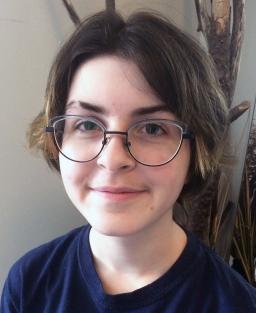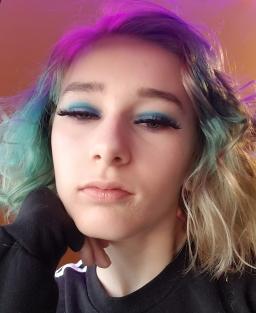In this vibrant art exhibition, Manitoba youth express their views about human rights for themselves, their families and their communities. Their thought‐provoking artwork covers a range of issues that impact us all.
ARTiculate Our Rights (Level 6 Expressions Gallery)
July 30, 2021 to September 10, 2023
This exhibition has passed.
Tags:
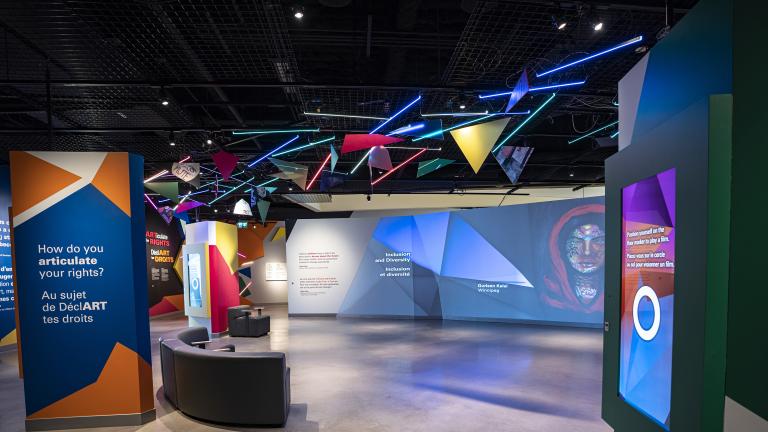
Photo: CMHR, Aaron Cohen
Exhibition details
Today’s youth have important messages to share about our shared present and future. They are deeply invested in the outcome of many contemporary rights issues including environmental rights, Indigenous rights, educational rights, democratic rights and others.
We invited students from all over Manitoba to imagine the future for human rights and how these rights will impact people’s lives. This exhibition assembles and proudly shares over 100 artworks submitted by Manitoba students in vivid digital format.
The works offer an engaging experience as diverse and exciting as the artists themselves.
Explore the wide range of themes and variety of approaches taken by these young artists in this animated video.
Video: Articulate Our Rights
Take a Closer Look
Explore four powerful works of art that express diverse human rights themes important to youth in Manitoba today.
Fizza Arshad: The threat of technology
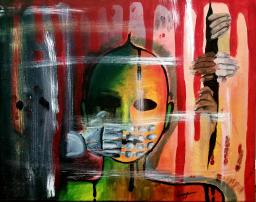
“The common perception is that human rights are advancing along with our technology,” says Arshad, a 16‐year‐old student at Dakota Collegiate in Winnipeg. “People forget that one of the biggest rights being violated by this technological world is our privacy and right to unmanipulated thoughts.”
In her work, the robotic hand represents future technologies, the abstract face represents human rights, and the hands reaching out from the darkness make futile attempts to stop this violation before they are finally shut away.
As a first‐generation immigrant from Pakistan, Arshad knows people who have suffered “some really bad things.” But her art reminds us that threats to human rights exist all over the world. “People think here in Canada everything is great and human rights are respected but I’ve seen so many people go through discrimination from teachers and schoolmates. I’ve seen these things happen myself.”
Énnessa Danais-Small: A call for inclusion
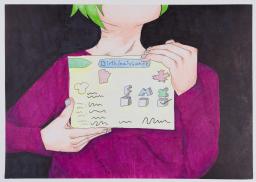
“I believe with all my heart that non‐binary rights are human rights and genderqueer rights are human rights,” says Danais‐Small, a 15‐year‐old from Ste. Anne who attends Collège régional Gabrielle‐Roy. “There is not only female and male. And with this art, I see a future where the government respects them too, by adding one little box.”
The artwork depicts a person holding a census form with a third gender option. It’s a concept Danais‐Small embraces, but never learned about in school.
“For the longest time, you don’t even know that such a thing as ‘non‐binary’ even exists because it’s something that’s not really talked about.”
For this project, when thinking about what human rights they would want to see in the world, Danais‐Small thought about themselves and their queer friends, and about a world where they wouldn’t be harassed for being who they are.
Xandria Griffiths: The right to communicate
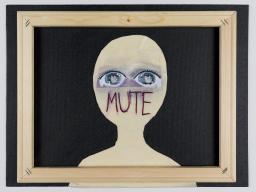
“My picture shows a girl wrapped up like a mummy, who can’t communicate,” Griffiths says in American Sign Language, interpreted by her dad. “If you look into her sad eyes, you’ll see the sign for ‘I love you.’ I hope all kinds of communication will be accepted in the future.”
A 13‐year‐old student at the Manitoba School for the Deaf in Winnipeg, Griffiths has a passion for art and has already produced a stack of creations. She hopes to one day become the art instructor at her school like teacher Leslie Baldwin, who inspired the idea for this artwork.
Using masking tape, paint, canvas and glue, Griffiths tried to relay the pain and frustration that Baldwin felt as a child,forbidden to use sign language and forced to attempt speech instead.
“We’re really lucky now because we’re allowed to sign. Things have changed. Kids now sometimes have families where not everyone signs, but most people try and it’s very different than before.”
Curtis Thomas: Understanding mental illness
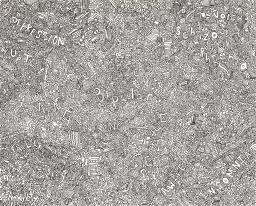
“I suffer from anxiety and depression, and drawing helps me,” says Thomas, a 17‐year‐old student at Miles Macdonell Collegiate in Winnipeg. “I do a lot of doodles. At night, I spend a lot of time staying up and drawing because I have insomnia.”
Thomas’ incredibly intricate and detailed artwork is filled with a network of tiny lines, shapes, letters and words. It represents an attempt to relay what goes on in his head, he says, and he completed it over the course of several late nights.
His art teacher encouraged him to submit a piece for the exhibition, in recognition of his personal talent and his passion for this form of self‐expression. Thomas hopes his art can speak to people about the need for awareness, understanding and respect for people suffering not only from mental illness, but from the stigma that surrounds it.
Interviews
Teachers, artists, curators and educators reflect on human rights, art, youth, and the work displayed in ARTiculate Our Rights.
Youth perspectives on human rights
About ARTiculate Our Rights
Art as communication
Interactive gallery
Acknowledgements
This exhibition was developed by the Museum in collaboration with educators and students from across the province of Manitoba. The Museum thanks all the youth entrants for their inspiring and compelling submissions.
Selected works from ARTiculate Our Rights were displayed on large billboards outside at the Forks in the summer and fall of 2020. We thank the members of the ARTiculate Our Rights 2019–2020 jury:
- Candace Lipischak, multidisciplinary artist
- Mercedes Emeka Maduka, multidisciplinary artist
- Connie Wyatt‐Anderson, educator
- Jackie Wild, Manitoba 150 representative
- Karine Duhamel, former Curator, Indigenous Content, CMHR
- Lise Pinkos, Manager, Education and Professional Programs, CMHR
Sponsors
ARTiculate our Rights is generously supported by:
See more at the museum
Visit ARTiculate Our Rights for an exciting look at what matters to youth today and be inspired by their creative messages of hope, unity and inclusion for all.
ARTiculate Our Rights is displayed in the Level 6 gallery starting July 30, 2021.

